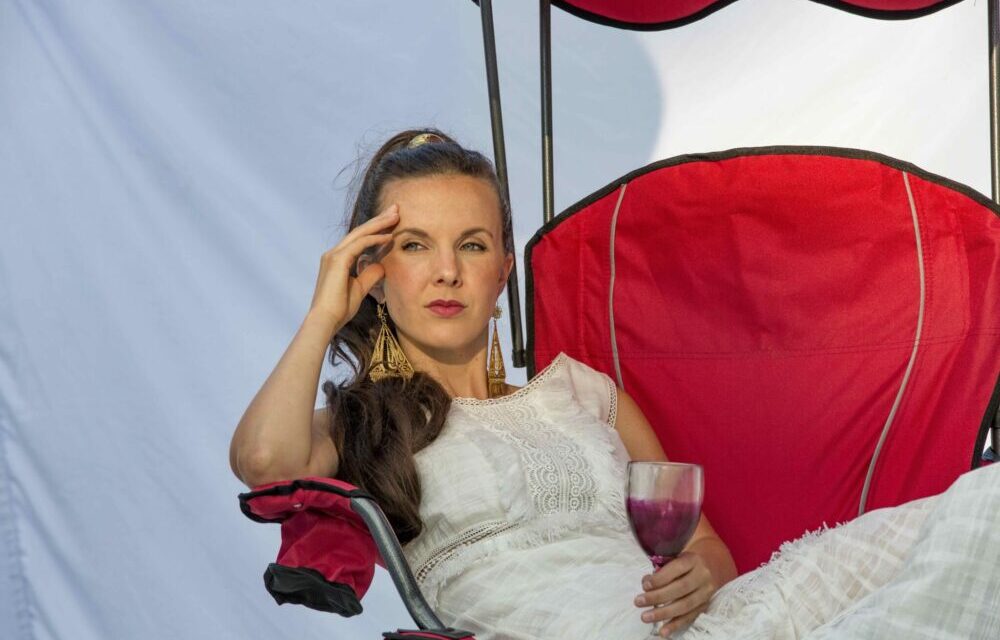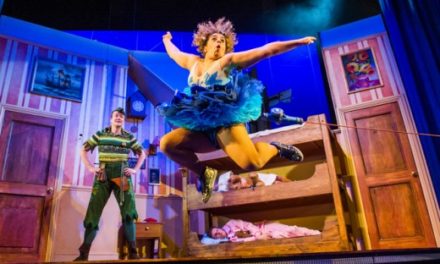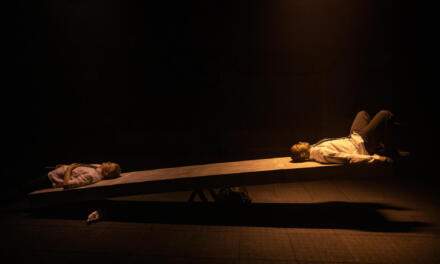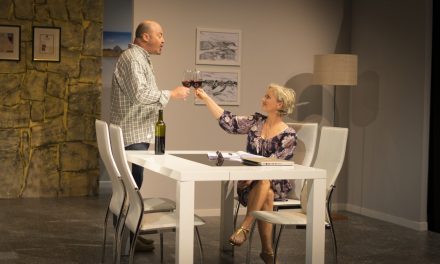Imagine, if you will, one of those old-fashioned TV game shows with two doors. Behind Door Number One is the Odysseus we all know from the Homerian epic: valiant hero, master strategizer, savvy trickster, and luckless victim of the gods’ perverse whims.
Behind Door Number Two? Well, that’s the bedraggled guy (a long-haired and magnificently bearded Sam Turich) who washes up on the shores of Phaeacia and gets cajoled by a bored and restless Princess Nausicaa (Erika Strasburg) into recounting the details of where he’s been for the past decade. It’s a story he’s very reluctant to tell, because (spoiler alert!) he’s done a lot of things no person would be proud to boast about, let alone carry home to his long-suffering wife Penelope (Catherine Growl). For as Jay Ball’s wittily resistant retelling of the Homeric epic observes, The Odyssey can be boiled down to a story of a group of armed White men repeatedly landing in places inhabited by people who don’t resemble them in looks or customs. And, well: we all know how that story really goes.
In Ball’s version – aptly named An Odyssey – Odysseus is not only an ur-Colonizer who invades foreign lands, destroys everything of value to the native inhabitants, and leaves them traumatized, he’s also the quintessential Mediocre Man, overconfident and overcompensated because the sociopolitical world has been designed expressly to give people like him free pass after free pass. How the Mediocre Man behind Door Number Two might have become the hero behind Door Number One is the question at the heart of Ball’s exceptionally satisfying adaptation.
I shan’t give the answer to that question away, because it’s the unexpected twist in a production that asks you to think in a twisty way about who tells certain stories and why they need those stories to tell certain truths. What I will say is that An Odyssey demands that its actors juggle many complicated and shifting motivations for their characters, and they do so with great finesse. Turich, for example, is constantly maneuvering between the frat-boy-bravado of the Odysseus who is, in the understated words of his most loyal soldier Gryllus (Shammen McCune), “kind of a dick,” and the older man who regretfully confesses that his main talent in life has been to “drift.” Strasburg likewise adroitly ping-pongs back and forth between being Odysseus’s harshest critic and his most eager booster.
Director Jed Allen Harris always seems most in his comfort zone when he can mix and match theatrical styles and tones, and Ball’s script gives him ample room to move from the serious to the satirical to the playful and silly to the tragic. The production offers comedy in several registers, including slapstick stage fights (choreographed by Randy Kovitz) and a couple of bawdy audio jokes (in Joe Pino’s terrific sound design). It also has moments of poignant tragedy, particularly in the reenactment of Odysseus’s encounter with Polyphemus, the Cyclops, which takes on added resonance as a story of brutal colonization through the casting of Sam Lothard, a Black actor, as the victim of the Greeks’ violent xenophobic “othering.” Lothard ends this scene with a poignant and heartbreaking plea for justice, and then remarkably returns to the stage a few minutes later in a high comic turn as an asthmatic and double-entendre-spouting Hermes. Such is the affective whiplash Harris delights to serve up.
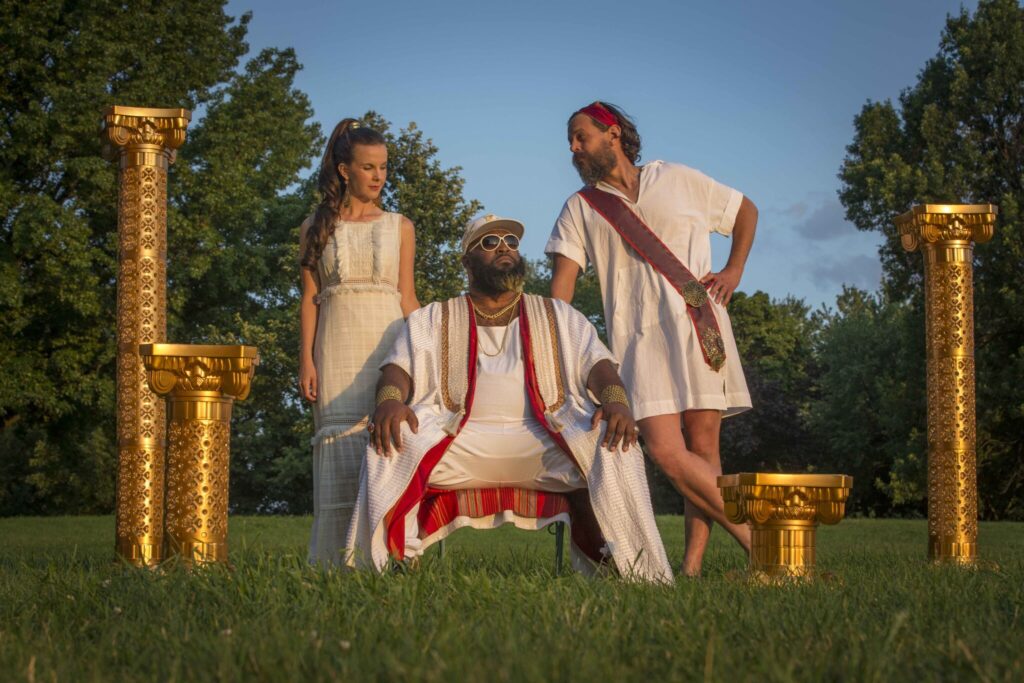
L to R: Erika Strasburg, Sam Lothard, and Sam Turich. Photo by Heather Mull, courtesy Quantum Theatre.
The rest of the ensemble skillfully exploits their playing of multiple characters to deepen the “resistance” of this adaptation to its original source. Growl connects the (otherwise wildly divergent) roles of Penelope and Circe in their shared desire to be cherished: when, as Circe, she sings “give me a reason to love you; I just wanna be a woman,” it’s readily apparent that Penelope might sing the same refrain but for different reasons. McCune establishes a bittersweet arc as both Nausicaa’s loyal servant, and as the soldier Gryllus, who comes to renounce the cruelty of human nature and choose a state in which she “hurts no one.” And Nancy McNulty and Grace Vensel round out the ensemble by playing multiple characters with both serious commitment and comic aplomb (McNulty has fantastic moments as an overeager warrior in service to both Nausicaa and Odysseus, and the young Vensel is particularly delightful as Odysseus’s deceased mother in Hades, who misses her dogs more than her son).
The production’s design is likewise a happy mixture of the serious and the playful. Scenic designer Narelle Sissons has transformed the ice rink in Schenley Park into a sea of masts connected by rope, many of which are draped with laundry in a shoutout to the original “Nausicaa” episode from The Odyssey. The design is also animated by the addition of inflated plastic flowers, blue tarps, outdoor lounge chairs, a luggage cart that serves as Odysseus’s ship, and – serendipitously on the evening I saw the show – by the wind itself. (Nature clearly has a role to play in this outdoor production; on opening night, in addition to some well-timed breezes, we were also the beneficiaries of a gorgeous sunset that enhanced the lighting design). The aesthetic of the scenic design is, like the play itself, at once grand and DIY, and Harris takes advantage of the elements provided in the design to produce a number of delightful theatrical moments (the transformation of the tarp into a giant wave garnered a round of applause on opening night). Mindy Eshelman’s costumes similarly straddle the serious and the cartoonish, with clothes that do double duty to simultaneoulsy call up Ancient Greece and the 21st century. Costume jokes abound, including Hermes’ appearance as a UPS delivery man, and Eshelman’s use of a tarp to turn the Sirens into a three-headed “wave” is downright ingenious. Designers Joe Pino and C. Todd Brown create sound- and lightscapes that precisely calibrate the mood and tone of the production as it shifts registers from the serious to the silly.
The production ends with the grandest shift of all: after Odysseus recounts the version of his story that earns him passage back to Ithaca courtesy of Princess Nausicaa’s father King Alcinous, he takes us with him, leading us out of the rink and up the hill to a skeptical Penelope. Who, in fact, has finally returned? The hero behind Door Number One, or that jerk behind Door Number Two?
This article was originally posted in The Pittsburgh Tatler on 17 August 2021, and has been reposted with permission. To read the original article, click here.
This post was written by the author in their personal capacity.The opinions expressed in this article are the author’s own and do not reflect the view of The Theatre Times, their staff or collaborators.
This post was written by Wendy Arons.
The views expressed here belong to the author and do not necessarily reflect our views and opinions.

